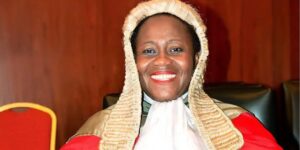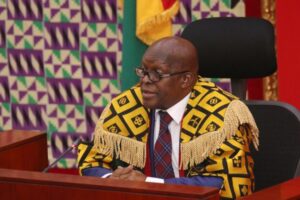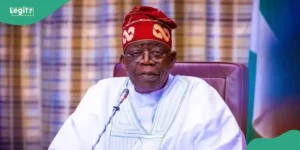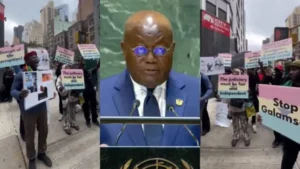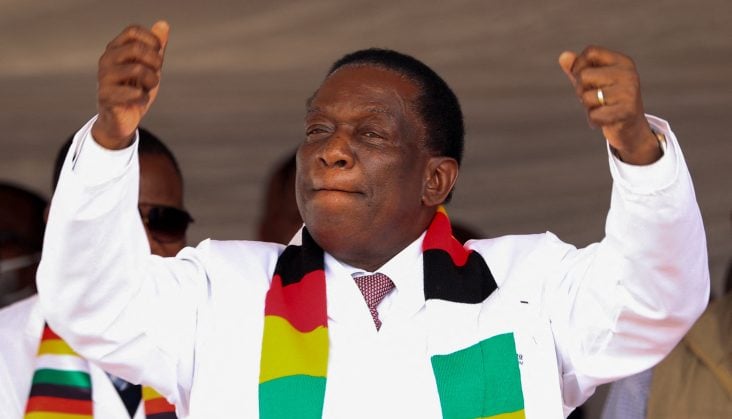
Source: The Africa Report.
American officials could not hide the presence of sanctioned Zimbabwean president Emmerson Mnangagwa at the US-Africa Business Summit.
In Botswana this week to tout progress in two-way trade and investment in the six months since the December leaders summit in Washington, the Joe Biden administration found itself under pressure to explain its participation alongside Zimbabwe’s sanctioned head of state.
As President Mnangagwa hobnobbed with his Southern African peers, the gathering’s US organisers were scrambling behind the scenes to limit the fallout.
The US government formally asked President Mokgweetsi Masisi to rethink his invitation to his northeastern neighbor, The Africa Report has learned, without success.
Backup plans were hatched. Some US officials skipped the summit entirely. The ones who didn’t kept Mnangagwa at arm’s length.
The disagreement could put a damper on Botswana’s ability to deepen diplomatic and business ties with the US.
“We’ve definitely noted what has happened here,†Joy Basu, the deputy assistant secretary of State in charge of economics and regional affairs on the continent, told The Africa Report. “And so have our counterparts in Congress. The US government is a complex organization, with different stakeholders.â€
Meanwhile, the nonprofit Corporate Council on Africa (CCA), which organizes the summit, sought to limit Zimbabwe’s visibility as much as possible. That proved difficult.
Standing tall in his signature colourful scarf, the Zimbabwean leader took centre stage on 12 July right next to President Masisi in the summit’s group portrait on the front steps of Gaborone’s brand-new Royal Aria Convention Centre. As a result, US government officials skipped the photo entirely.
A few hundred feet away, Zimbabwean flags adorning one of the Aria’s meeting rooms signalled to all that the country is “open for businessâ€, as Mnangagwa likes to repeat.
“We are very happy to be here as the government of Zimbabwe at the US-Africa Business Summit,†a jubilant Amon Murwira, Zimbabwe’s minister for higher education, told The Africa Report. “Our policy is very simple: We have a policy of engagement and re-engagement and we also have a policy of enemy to none, and a friend to all.â€
Asked if his delegation felt welcome, Murwira called Gaborone “a home away from homeâ€.
“We’re here upon invitation,†he said. “That’s the most important thing.â€
The Zimbabwe delegation, Murwira added, was “here meeting with businessesâ€. He pointed out that US tractor maker John Deere has contracts worth millions of dollars with Harare to supply hundreds of tractors to Zimbabwe’s farmers.
Zimbabwe’s neighbours in the Southern African Development Community (SADC), who have long called for the lifting of US sanctions, could not help but smirk at the awkward situation. The US sanctions target individuals and businesses accused of human rights abuses and undermining democracy, not the country as a whole or its banking sector.
“I’m sure they did crash the party,†a clearly amused trade minister from a Southern African nation told The Africa Report. “At the highest level possible!â€
Backlash
The backlash in Washington began almost immediately after the CCA posted an initial tweet on 2 June listing the heads of state expected at the summit, including President Mnangagwa and eSwatini King Mswati III.
“This is an abomination,†Jeffrey Smith, who heads the pro-democracy lobby group Vanguard Africa in Washington, said on Twitter. “[The CCA] has a history of feting dictators and whitewashing human rights abusers for American businesses. Now, they’ll collect hefty conference fees by selling access to Swaziland’s murderous king and Zimbabwe’s despot who is under US sanctions.â€
A month later, both heads of state had disappeared from CCA’s social media messaging, prompting Smith and other Zimbabwe watchers to assume Mnangagwa wouldn’t be attending after all.
Meanwhile, Congress was also getting in on the act.
On 21 June, the top Republican on the powerful Senate Foreign Relations Committee, Idaho Senator James Risch, wrote to CCA President and CEO Florizelle Liser to express his “deep concern†about Mnangagwa’s participation.
In the letter obtained exclusively by The Africa Report, Risch recapped that Zimbabwe’s leader has been sanctioned by the US since 2003, when he was speaker of parliament, for undermining democratic processes and institutions.
Meanwhile, Risch wrote, under the Zimbabwe Democracy and Economic Recovery Act (ZDERA) of 2001, “Congress has asserted that closer relations between the United States and Zimbabwe, ‘including in the areas of trade and investment’, should not be pursued until the government of Zimbabwe undertakes serious and credible economic reformsâ€.
Mnangagwa’s planned attendance, Risch added, was “imprudent†and “complicates US government official participation in and support for the summitâ€.
The senator said his office would “endeavor to apprise US business leaders of the potential negative consequences and impacts of engaging in business dealings with individuals designated under [ZDERA] or members of a government engaged in highly opaque and corrupt business dealings and kleptocratic behaviorâ€.
In a subsequent 7 July letter to the five high-level US officials expected at the summit, also obtained by The Africa Report, Risch wrote that their participation “would send a wholly inappropriate signal about the validity and seriousness of US accountability mechanisms and support for the American private sector to engage with such individuals in business dealingsâ€.
He went on to ask the US officials to detail whether their agencies were paying sponsors of the summit.
That letter was sent to the head of the US delegation, US International Development Finance Corporation (DFC) CEO Scott Nathan; White House senior director for African Affairs Judd Devermont; US Trade and Development Agency Director Enoh Ebong; US African Development Foundation President and CEO Travis Adkins; and Johnnie Carson, the Biden administration’s point person for implementation of the commitments from the December leaders summit.
Officially, the US government says Mnangagwa’s invitation was out of their hands.
“That’s between Zimbabwe and Botswana,†Cynthia Griffin, the US Commerce Department’s regional commercial officer for sub-Saharan Africa based in Johannesburg, told The Africa Report. â€I don’t know about [anybody] crashing [the summit]. We’re glad to be here.â€
Disappearing act
Still, the criticism has had an impact. Two of the five US officials targeted by Risch ended up skipping the business forum.
Johnnie Carson, who turned 80 in April, opted not to travel after falling ill, The Africa Report has learnt.
Adkins was also absent in Botswana. He did not respond to a request for comment.
The CCA also felt it could not prevent their sovereign host from inviting whoever it wanted. Mnangagwa previously attended the US-Africa Business Summit in Maputo, Mozambique, in 2019, without similar backlash.
Instead, the business promotion group did what it could do to limit the damage.
 An ‘Invest in Zimbabwe’ event scheduled for the morning of 13 July disappeared from the program, without explanation.
A 12 July CCA tweet thanking Mnangagwa for “gracing us with his presence†was soon deleted following an outcry from Risch. In a follow-up, the CCA said it “disavows†that message, blaming a contractor acting “without knowledge or approval of CCA’s leadershipâ€.
“We have deleted the tweet,†the business group said, “as it does not reflect CCA’s views.â€
